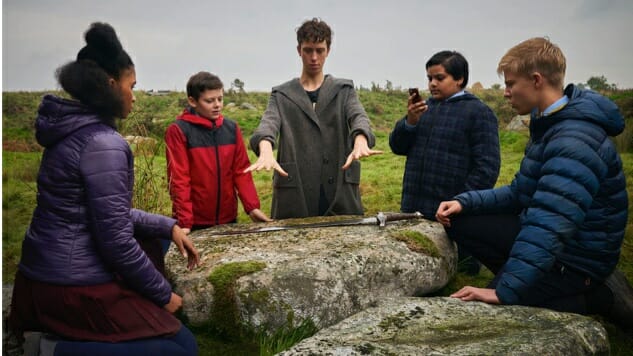
In our divided times, full of tribalist posturing and a culture that seems to thrive on greed, selfishness and scorn, it’s easy to lose track of the message we’re sending to kids. They look at the future, and what do they see? A planet in peril, grownups demonizing one another based on nationality, wealth and race, and self-aggrandizing leadership that seems more concerned with preserving power by any means than with compromise for the greater good.
So what better time to retell the King Arthur origin story as a witty, charming and rousing family fantasy/adventure? The Kid Who Would Be King is a sure-to-be modern children’s classic that reminds its core audience—and perhaps even some adults—that we might still find hope in our future leaders if passé values like compassion, chivalry, compromise, virtue and honor are remixed back into society.
Any creative tasked with reinvigorating a public domain myth or fable would do well to take notes from writer-director Joe Cornish’s fresh and thrilling take on the Arthurian legend. Cornish follows the story structure we know and expect from this tale: Arthur, a lowly but brave peasant, is the only one to pull Excalibur from its stone. With the help of Merlin the wizard, Arthur the new king leaves his ego behind, finds compromise to bring his enemies together at the round table, and fights the common enemy to heal the country as a whole. Cornish follows this narrative closely, while applying it to a contemporary middle school adventure full of witty meta humor and adorably dorky but brave protagonists, with a side of heartfelt sociopolitical alarm bells about the kind of world we’re setting up for our young ones.
The legend tells, in the form of boisterous opening narration accompanied by some colorful children’s textbook animation, that Arthur and his brave knights were able to defeat Arthur’s evil sister, Morgana (Rebecca Ferguson), and cast her into the bowels of hell. However, Morgana vowed to come back and cover the land in darkness when the land is once again bitterly divided the way it was before Arthur’s time. Cut to post-Brexit England, where half the country despises the other half, which Morgana understandably takes as an invitation to unleash her army of minions to take back the land. Will a hero of Arthurian stature show up to challenge her once again?
That hero, in true ’80s-style children’s fantasy fashion, comes in the form of a nerdy, meek, but pure-of-heart 12-year-old named Alex (Louis Ashbourne Serkis, an 11 on the instant adorability meter), who not only has to contend with the surrounding culture and media constantly reminding him how his country’s about to implode, but has to defend himself and his even nerdier best friend, Bedders (Dean Chaumoo), against school bullies Lance (Tom Taylor) and Kaye (Rhianna Dorris). Those familiar with the Arthurian legend might predict where this story’s going simply by looking at the character names, but Cornish’s specialty, as evidenced by his terrific London ghetto alien invasion adventure Attack the Block, lies is in applying sci-fi/fantasy tropes to invigorating new settings.
Just like Edgar Wright’s Cornetto Trilogy, Cornish—who has worked with Wright in the past—strikes a delicate tone between tongue-in-cheek references to clichés found in established genres, while professing their love for those clichés through nostalgic but energetic application. The Cornetto Trilogy and Attack the Block aren’t necessarily parodies, but they certainly do not take their hokey cinematic artifice too seriously. The Kid Who Would Be King continues in that tradition. Take the cliché, common to medieval fantasies, of magical formulas made up of the grossest ingredients possible. Merlin (Patrick Stewart, with Angus Imrie in high school-age disguise) needs a magical mix of goat piss, donkey tails, etc. in order to sustain himself in the realm of the living so he can warn Alex of Morgana’s return and train him for the upcoming fight. But where to find those ingredients in modern England? It turns out they can call be found at a nearby fast food franchise. The round table that brings together enemies Lance and Kaye to fight alongside Alex and Bedders? A convertible IKEA dinner table. Cornish delivers each familiar element with clever modern updates of Arthurian fantasy that serves as the source material.
A chunk of Alex’s quest is focused on finding his estranged father, whom Alex believes is a knight in hiding, waiting for the perfect time to reemerge and train his son. The result of this sub-plot is handled in a surprisingly delicate manner that steers away from tearjerking melodrama while offering some heartfelt empathy for children with families broken through no fault of their own. It also wisely follows in the footsteps of the likes of The Last Jedi and Spider-Man: Into the Spiderverse in its assurance that anyone, regardless of lineage, can be a hero. If you were to twist my arm to come up with one negative element, it would be the lack of variety in the villains who, apart from Morgana, are all the same monstrous hellish beasts who can be disposed of like the battle droids from the Star Wars prequels. But in true pre-2017 MCU fashion, Cornish creates such lovable heroes that the lack of original villains becomes an afterthought. Full of fun, witty writing, natural performances by the young leads, and epic fantasy cinematography with open vista shots reminiscent of The Lord of the Rings trilogy, The Kid Who Would Be Kid hits the family classic trifecta: Spectacular fun for kids and adults, full of important themes, and a rebellious attitude in regard to the wide range of things grownups are messing up.
Director: Joe Cornish
Writer: Joe Cornish
Starring: Rebecca Ferguson, Patrick Stewart, Louis Ashbourne Serkis, Dean Chaumoo, Tom Taylor, Rhianna Dorris, Angus Imrie
Release Date: January 25, 2019
Oktay Ege Kozak is a screenwriter, script coach and film critic. He lives near Portland, Ore., with his wife, daughter, and two King Charles Spaniels.